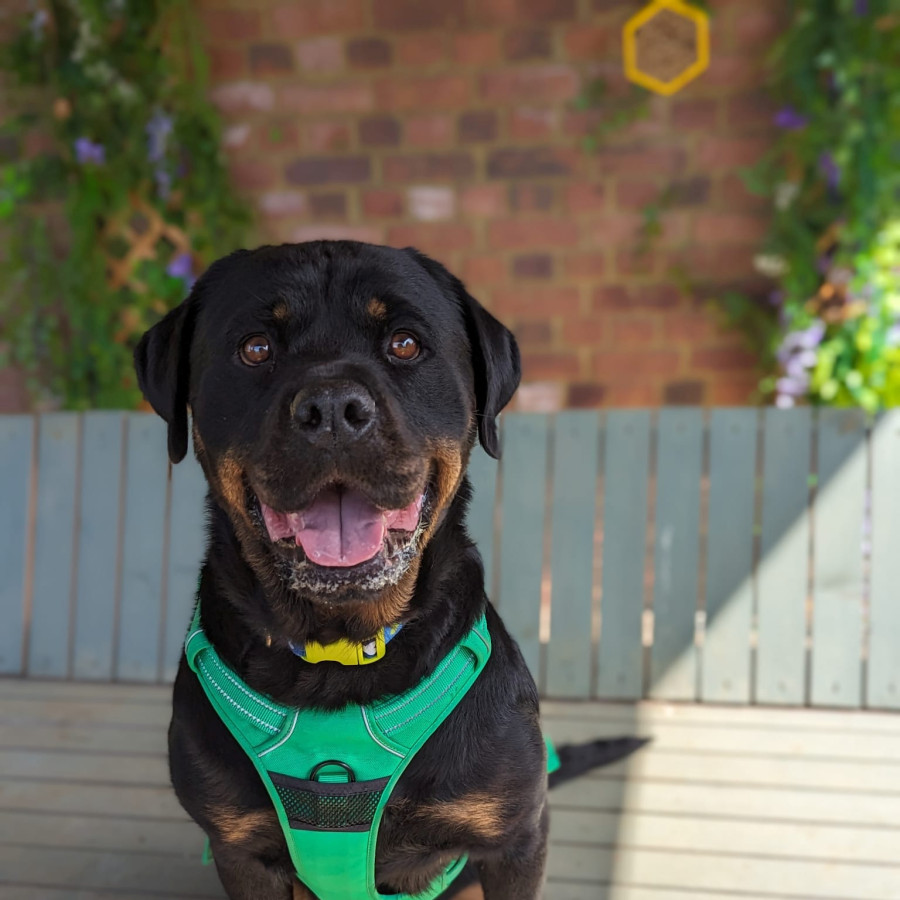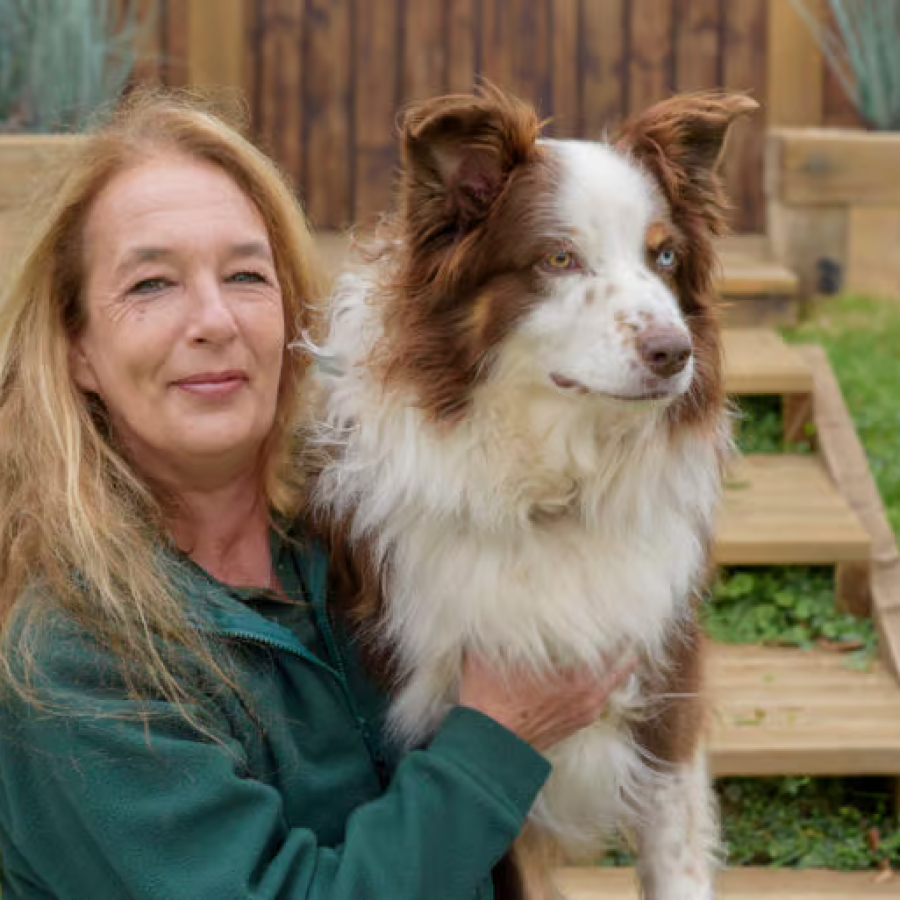
Rottweiler Dog Breed
Rottweilers are confident and intelligent dogs who are best suited for an experienced family.

Rottweilers are confident and intelligent dogs who are best suited for an experienced family.
Rottweilers are an active, intelligent breed and incredibly loyal to their family. They were originally bred to be working guard dogs, so for this reason, training and exposure to everyday scenarios and home life are key. This will help them grow into a well-rounded canine companion.
Rottweilers are confident and self-assured, but that doesn’t mean they can’t be total softies with their favourite people. They’re slightly aloof around strangers and need support, especially if you’re a busy family with lots of comings and goings. Some Rottweilers have a serious attitude, while others are happy-go-lucky clowns.
Generally, Rottweilers have a wait-and-see approach to their environment. As they’re quite a powerful breed, they need an experienced owner who can dedicate time to obedience training to help their responses, especially when out in public. Although they’re an active breed that enjoys lots of mental and physical exercise, at home you’ll often find they’re quite laid back.
Disclaimer
While these breed traits give a general idea of what to expect from a specific type of dog, it's important to remember that every dog is unique. Just like people, each dog comes with their own distinct personality, quirks, and characteristics!

Rottweilers are great dogs for families! They can be amazing with children and other pets in the home, especially when raising a young Rottweiler puppy within the family. Even adult Rottweilers can fit in with a family when matched and managed correctly. Back in the day, this breed was used for herding cattle, so naturally they have a strong desire to chase, so take extra care if you have very small children running around.
Like with any dog, no matter their breed, you shouldn’t leave a dog alone with children, dogs like their personal space and this needs to be respected. Due to their guarding instincts, they may not be the best pets for a busy household with lots of comings and goings.
Yes, absolutely! Rottweilers are very playful; they love chasing and tugging their toys. They are just such big, powerful dogs, so setting rules and boundaries is important when it’s playtime. Rottweilers can’t help themselves but get carried away during play and could accidentally knock someone over.
Teaching your Rottweiler to ‘drop’ and getting them to understand when to be calm will be very useful. As they do tend to guard things, Rottweilers can become obsessive and sensitive over their toys, so it’s important to swap toys and not take them out of their mouth.
Rottweilers can be overly confident when meeting other dogs in public and their posture can be quite intimidating. Rottweilers need to socialise with a variety of dogs from a young age to avoid any dog-related aggression in the future.
A Rottweiler’s owner should have a good understanding of the dog’s body language, so they know when they’re feeling uncomfortable.
Muzzle training is recommended, even if you have a gentle giant, it’s just appreciated in scenarios when other people need to be close to your dog, like a vet.
Due to their guarding instincts, they can develop a tendency to resource guard items or food. The development of these behaviours can often be avoided by training and management from a young age.
Rottweilers are the ultimate working dogs, so they need to keep their brains working. If they don’t get this mental exercise, they can become frustrated leading to aggressive behaviours.
Depending on the dog itself, Rottweilers have medium to high exercise needs and must have their daily walks. Because they’re quite aloof and wary of strangers, they’re best suited to living in rural or semi-rural areas, rather than the hustling bustling city.
As well as physical exercise, Rottweilers are very intelligent and need to work their minds too with plenty of Mental stimulation. They require regular training sessions to keep them manageable and under control in the home and out in public.
They tend to form strong bonds with their family as long as they feel safe and secure in their relationships. Taking part in lots of bonding activities such as regular play or training sessions will strengthen your relationship.
All puppies need to learn how to be around people, pets, and other dogs, calmly and politely (known as socialisation). They also need help to feel calm, comfortable, and confident in everyday situations like travelling, the sound of traffic, and being in busy places (known as habituation). This is essential to prevent tricky behavioural problems in the future, and you'll be off to a great start with your ongoing training.
For many years, Rottweilers have been used in the police as well as for search and rescue operations. They’re incredibly hard-working and generally easy to train. They need consistent and clear communication from their owner.
Playtime is also a great way of incorporating training while helping to build a strong relationship with your canine companion. It is important to invest time in training and socialisation when your Rottweiler is young, so they know how to behave and react to strangers, other dogs, traffic, and everything they could meet in public.
Owning a strong and powerful dog breed like a Rottweiler it is a big responsibility to showcase their qualities. Training doesn’t stop at puppyhood or adolescence, it’s a lifelong commitment to make sure your Rottweiler is a happy and well-balanced dog.
Rottweilers have a double coat with medium-length fur sitting flat against their body and a shorter undercoat which sheds with the changing seasons. Overall, their coat is quite coarse and dense which adds to the thickness of a Rottweiler’s fur.
They don’t need much grooming, a weekly brush will do. Bathing will remove any dirt, debris, or potential allergens. A dog can have a bath once a month or less, be aware that too much bathing can cause your Rottweiler’s coat to dry out.
Rottweilers can have long dew claws (a fifth digit on their paws) which can grow into the skin or can easily get caught on things, so they need to be regularly maintained and clipped.
Rottweilers are prone to gaining excess weight, so regular exercise and a balanced diet will maintain good health.
As they’re a large breed, Rottweilers can suffer from joint problems such as elbow or hip dysplasia, and early onset of arthritis. Keeping up appropriate exercise levels is important, as too much will put strain on the skeletal system. Rottweilers are also prone to develop fatty lumps, but also cancer later in life, especially osteosarcomas (a common bone cancer in dogs). Keep a close eye on the potential development of lumps and bumps and their growth.
Hypothyroidism is also something to be aware of in this breed, any changes in body weight, behaviour, energy levels, changes in their coat or hair loss, need to be followed up with a visit to the vet.
For me to be able to relax in the home, I need physical exercise first, at least 1.5 hours a day. Mental exercises like play and training will also keep me busy.
I was bred to do lots of jobs, so it’s important to keep my brain working. Lots of puzzles, play, and obedience training will make me feel good about myself.
I love obedience training and excel in dog sports like scent work. I need to be cautious with activities that put a lot of strain on my joints such as agility.
Buying a Rottweiler puppy from a Kennel Club registered breeder can cost anywhere between £1,200 and £2,500. Adopting a Rottweiler from a respected charity will be more cost-efficient and will come fully vaccinated and potentially neutered before adoption.
As with any large dog breed, the monthly costs can leave a hole in your pocket. Some of these costs to factor into your budget include essentials such as food, health insurance, vaccinations and veterinary care. Accessories such as walking equipment, bedding, toys and enrichment will cost more than if you have a smaller dog due to their size. On average, the monthly costs of owning a Rottweiler could be anywhere between £100 to £200.
Take our quiz to discover which breed is right for you
Take our quizPlease call our pet support line on 0300 303 9333 (7 days a week – 8.30am - 4pm)